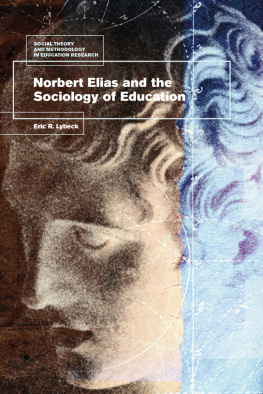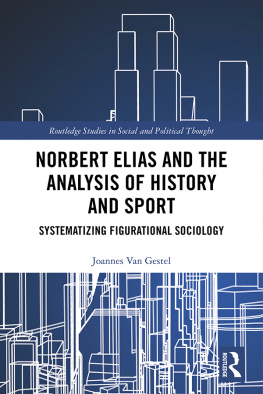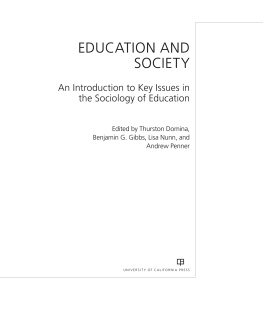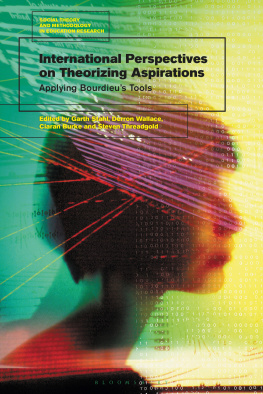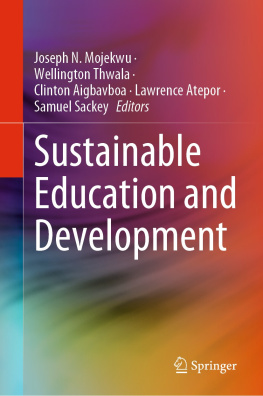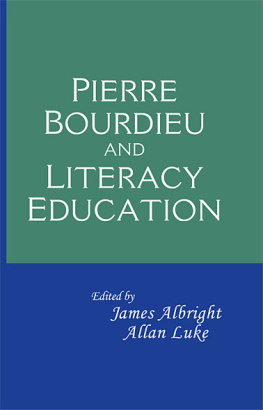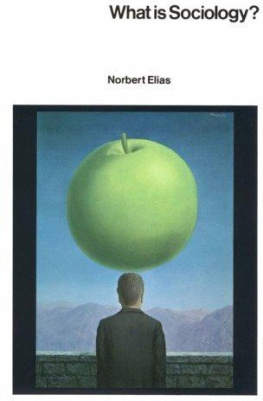
Norbert Elias and the Sociology of Education
Norbert Elias and the Sociology of Education
Eric R. Lybeck

BLOOMSBURY ACADEMIC
Bloomsbury Publishing Plc
50 Bedford Square, London, WC1B 3DP, UK
1385 Broadway, New York, NY 10018, USA
BLOOMSBURY, BLOOMSBURY ACADEMIC and the Diana logo are trademarks of Bloomsbury Publishing Plc
First published in Great Britain 2020
Copyright Eric R. Lybeck, 2020
Eric R. Lybeck has asserted his right under the Copyright, Designs and Patents Act, 1988, to be identified as Author of this work.
For legal purposes the constitute an extension of this copyright page.
Cover design: Anna Berzovan
Cover image Nanette Hoogslag / Getty Images
All rights reserved. No part of this publication may be reproduced or transmitted in any form or by any means, electronic or mechanical, including photocopying, recording, or any information storage or retrieval system, without prior permission in writing from the publishers.
Bloomsbury Publishing Plc does not have any control over, or responsibility for, any third-party websites referred to or in this book. All internet addresses given in this book were correct at the time of going to press. The author and publisher regret any inconvenience caused if addresses have changed or sites have ceased to exist, but can accept no responsibility for any such changes.
A catalogue record for this book is available from the British Library.
A catalog record for this book is available from the Library of Congress.
ISBN: HB: 978-1-3500-4118-9
ePDF: 978-1-3500-4258-2
eBook: 978-1-3500-4119-6
Series: Social Theory and Methodology in Education Research
To find out more about our authors and books visit www.bloomsbury.com and sign up for our newsletters.
Social Theory and Methodology in Education Research series
Edited by Mark Murphy
The Bloomsbury Social Theory and Methodology in Education Research series brings together books exploring various applications of social theory in educational research design. Each book provides a detailed account of how theory and method influence each other in specific educational research settings, such as schools, early childhood education, community education, further education colleges and universities. Books in the series represent the richness of topics explored in theory-driven education research, including leadership and governance, equity, teacher education, assessment, curriculum and policy studies. This innovative series provides a timely platform for highlighting the wealth of international work carried out in the field of social theory and education research, a field that has grown considerably in recent years and has made the likes of Pierre Bourdieu and Michel Foucault familiar names in educational discourse. Books in the Social Theory and Methodology in Education Research series offer an excellent resource for those who wish to use theoretical concepts in their research but are not sure how to do so and who want to better understand how theory can be effectively applied in research contexts, in practically realizable ways.
Also available in the series
Education Governance and Social Theory , edited by Andrew Wilkins and Antonio Olmedo
International Perspectives on Theorizing Aspirations , edited by Garth Stahl, Derron Wallace, Ciaran Burke and Steven Threadgold
Foucault and School Leadership Research , Denise Mifsud
Social Theory for Teacher Education Research , edited by Kathleen Nolan and Jennifer Tupper
Forthcoming in the series
Education Research with Bourdieu , Julie Rowlands and Shaun Rawolle
Poststructuralist Theory and Educational Research , Tim Jay
The Future of Qualitative Research , edited by Matthew Thomas and Robin Bellingham
Contents
This book was conceived as an interesting intervention to introduce researchers in the sociology of education to a social theorist they might be less familiar with, Norbert Elias. I did not realize then the task I had set out for myself, and I realize now this book could only be the first step towards much wider conversation, which I am even more convinced is worth having. So, I am now more grateful than ever to Mark Murphy, whose call for contributions to a new book series on applied social theory, particularly in the field of education research, provided a welcome prompt for this exploration. I was further encouraged by discussions with Stephen Mennell, who confirmed that, in his view, education was one of the most under-explored topic areas within the figurational sociology community. I can only hope that my far lesser knowledge of Eliass oeuvre can do justice to his encouragement as I make a start in this direction.
Concurrent to drafting the proposal for this book, I submitted an application to the Leverhulme Trust for an Early Career Fellowship that would explore the sociology of education from a figurational perspective. I am absolutely certain that I could not have written this book, or sustained myself, financially and intellectually, without the autonomy and support provided by Leverhulme, to whom I will remain indebted for the rest of my scholarly career. When developing this project, as a fixed-term lecturer, without a leg to stand on, I drew on the incredible support and advice from colleagues at the University of Exeter including David Inglis, Rob Freathy, Gabi Recknagel, Vivienne Baumfield, Deborah Osberg and more. Having just completed my doctoral viva at the University of Cambridge, where I developed many of the analytic frames that I flesh out more explicitly here, I obtained the indispensable critical support of John Holmwood and Andreas Hess. I was then able to develop the themes and theoretical potential captured here in a course on Education and Society at Exeter for two years, where I learned as much, if not more, from my students as they picked up from me.
In setting the course of action for the book so many moons ago, I am grateful to the editors at Bloomsbury Academic, particularly Maria Giovanna Brauzzi, who has patiently tolerated my false starts in delivering the book earlier this year due to the infinite joy of welcoming our new daughter to the family, the frustrations and anxieties of strike action against our universities over pensions, and the relocation to new cities and jobs. In our daughter, I can see the myriad ways in which a person comes to be themselves, while, at the same time, emerging out of a field of relationships, a loving family and, in time, schools, communities and our wider, developing society. Indeed, I can think of no process I would rather be involved in than that of working with my wife, Eleanor, to raise our wonderful Marianne. And, while we are on the topic, I must add my thanks to Eleanor for her expert advice and support while writing this book, being as she is the most brilliant scholar I know, of English literature, culture, criticism and everything else; who contributed more than anyone to the best elements of the book you see before you (and none of the worser bits); without whose encouragement I might not have sat down to write the thing itself!
As for the strikes, these were as frustrating and demoralizing, professionally and personally, as much as those positive sides of life in the past years have been enriching. I nonetheless found ways in which the historical perspective on higher education I had been developing could be put to use in supporting a nascent recovery of academics involvement in higher education policy that had otherwise gone off the rails due to unplanned processes and unintended consequences, as Elias described. I am particularly lucky to be involved in the interdisciplinary group known as USSbriefs, including Felicity Callard, Jo Grady, Leon Rocha and more, as well as to have been involved in a British Academy network for early career researchers working in the emerging field of critical university studies. I have Alison Wood to thank especially for inviting me into this network, where I have met others pushing the boundaries of the sociology of higher education, including Jana Bacevic, Richard Budd, Dina Belluigi, Sol Gamsu and more. In this emerging field, I have also been encouraged by discussions with Christopher Newfield, Liz Morrish and Helen Small. Meanwhile, at Exeter, I was grateful to get to know, through the strike, Clive Barnett, Ian Cook et al., Gail Davies, Peter Riley, Laura Salisbury and a host of others in departments I might have never met had I stayed within my disciplinary silo (which was, in fact, an interdisciplinary mix of sociology, philosophy and anthropology). I was also disappointed, when leaving Exeter, that my collaborative work with the emerging Global Systems Institute (GSI) led by Tim Lenton might lessen the opportunity to discuss potential points of integration between the processual sociology of higher education presented here and GSIs ambitions to tackle climate change and other systemic global problems. Certainly among the highlights of this collaboration was the evening in which Bruno Latour visited our house for a glass of sherry during a massive blizzard in March 2018 while we discussed the Gaia hypothesis.
Next page
